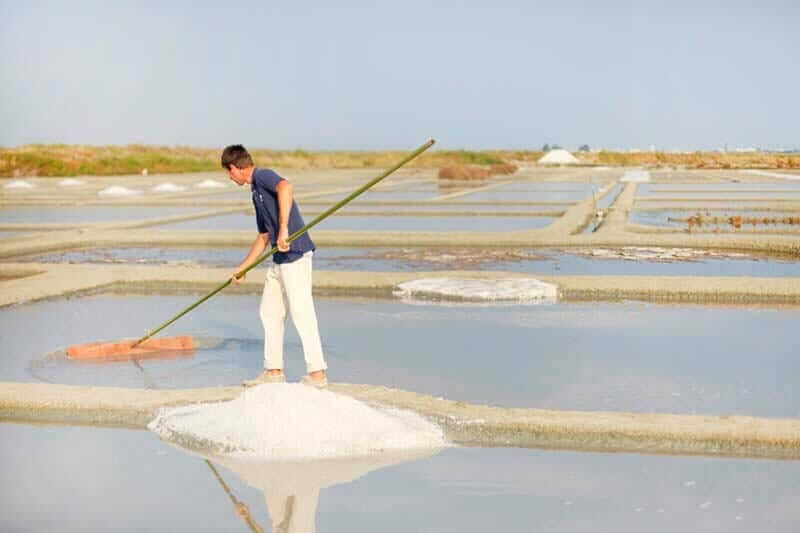10 Fabulous Facts About Salt You Didn’t Know!
Every single cell in our body contains salt. It is vital for the functioning of our body and is essential in maintaining the right balance of bodily fluids. We need salt to survive but at the same time, too much salt can be fatal!
On average every human body contains about 250g of salt, equivalent to a standard box of salt at the grocery store.
One of the fascinating things about salt is that it helps our cells to communicate by sending electrical impulses around the body, which controls our bodily senses such as taste, smell and other tactile responses. Salt also plays an important role in brain function and is fundamental to the process of sending signals to and from the brain.
So keeping balanced levels of salt in our bodies is extremely important. However, when we talk about salt, we don’t mean the cheap, refined table salt devoid of essential nutrients. We mean the unrefined, mineral-rich sea salt which allows liquids to be passed through the body’s membranes and blood vessel walls effectively.
But it’s not just body functioning and fluid transportation that makes this condiment so interesting. Salt has some legendary tales to tell, steeped in ancient purification practice and at one time more valuable than gold, you’ll be amazed to read about these weird and wonderful salt facts!

Our sea salt is harvested on the Atlantic coast of France by paludiers (salt harvesters) who do everything by hand. Salt has been harvested using these traditional methods for over 1000 years and seen as very demanding but noble work.
Photo Credit
1. An Antitode to Poison.
The saying ‘take things with a grain of salt’, meaning ‘to accept a truth but with skepticism,’ refers to the Roman philosopher, Pliny the Elder’s discovery of an antidote to poison. The antidote included a grain of salt, which if taken would dull the effects of the poison. Thus all threats involving poison would be taken with ‘a grain of salt’ meaning that the effects would be less serious.
2. Soldiers Used Wages To Buy Salt.
There is some controversy over whether Roman’s were paid in salt but there is no question of its importance throughout history. The word ‘salary’ derives from the Latin word salārium, which supposedly refers to the currency given to soldiers in order to buy salt. If a soldier was incompetent, his salary was cut, which is where the term ‘not worth his salt’ originated from. To be ‘worth his salt’ meant to be ‘worth his pay,’ which reflects how precious a commodity it was during the Roman Empire.
3. Salt Used To Be More Valuable Than Gold.
Nowadays salt is cheap and readily available, however, that was not always the case and was at one point so valuable that people named it ‘White Gold’. Up until the early 20th century, bars of salt called ‘amole’ were the basic currency for Ethiopians and still to this day Ethiopians speak of a millionaire as ‘he eateth salt’.
4. A Palace In Bolivia Made Entirely Out Of Salt.
Bolivia is home to the world’s biggest hotel made entirely out of salt! El Palacio de Sal (The Salt Palace) covers 48,500 square feet and was built using over a million salt bricks. It is being continuously rebuilt due to the dissolving rainy season which washes big sections of the hotel away.
5. You Can Drink Sea Ice.
Sea ice is drinkable! If you melt down an Iceberg you are able to drink the water because the ice on top of the sea is actually compressed snow that contains virtually no salt. When sea water freezes, salt cannot find a place in the crystal structure of ice. So if you’re ever stranded in Antarctica without fresh drinking water, you know where to find it!
6. Judas Is The Reason Why Spilling Salt Is Bad Luck.
If you look closely at a painting of The Last Supper you will see Judas Iscariot knocking over a pot of salt with his elbow, which is therefore meant to symbolize an act of the devil and is associated with betrayal and dishonesty. This is why if you accidentally spill salt, superstition tells us that you are supposed to throw it over your left shoulder in order to blind the devil and ward off evil.
7. Banishes Bad Spirits.
In Japan, salt is still thought of very highly and believed to be the ultimate purifier. In ancient Japanese culture, before a theatre performance, salt was sprinkled on stage to prevent evil spirits casting a spell on the actors. In the same way today, salt is sprinkled at the door of one’s home after they have attended a funeral to assure evil spirits do not follow them home.
8. The Natural Salt Mummies Of Iran.
Part of the Ancient Egyptians’ mummification process involved using salt to preserve and dry out the body and preserve the internal organs which were then separately embalmed and placed into jars. A few decades ago a group of natural salt mummies were found in the Chehrabad Salt Mine in Iran. The men were believed to have died in the salt mine and were so well preserved by the salt that they were easily recognized when discovered. The head of one of the first discovered salt men is displayed at a museum in Tehran and believed to be 1700 years old!
9. Sea Water Used For Blood Transfusions.
A large portion of our blood has a concentration of salt and other minerals that are very similar to that of the constitution of sea water. In World War II, when blood plasma wasn’t available, Navy Doctors would use sea water for emergency transfusions. Only mineral-rich sea water could be used in order for it to take on the same effect as blood by transporting vital nutrients around the body through cell membranes. Table salt does not have the same effect due to the fact that it has been completely stripped of vital nutrients which are essential for liquid transportation.
10. Used for Ritual Suicide in China.
Consuming too much salt can be fatal. In ancient China, only the aristocracy could afford salt due to its high expense and was used as the desired choice for committing suicide. The Chinese dynasty were known to be unspeakably cruel and have high suicide rates. A fatal amount of salt to ingest is 1 gram of salt per kilogram, therefore Chinese royalty would consume 1 pound of salt as a method of ritual suicide. Although believed to be the most effective means of suicide, it was also drawn out and very painful.
What a great fact to leave you with!
On a more uplifting note…
Where our salt comes from
We believe that the French grey sea salt we use is the best salt in the world!
Harvested from Brittany in France, our sea salt is straight from the Celtic Sea, which is one of the cleanest parts of the Atlantic Ocean. We take our sea salt from evaporated salt crystals that have formed within the ocean’s shallow pools of mineral-rich clay and which have a distinctive grey color due to the high content of minerals and nutrients present in the ocean’s natural clay. The purity of the salt ensures that no further processing is required, therefore you can rest assured that your Good-Gums bottle is filled with the finest and purest sea salt, making sure your teeth and gums are in very good hands!

Subscribe To Our Newsletter
Be the first to receive all our news, offers and natural oral health tips and articles.


